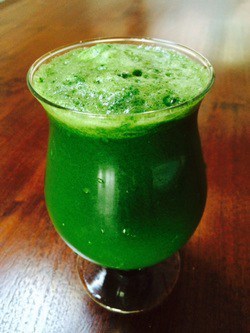There’s nothing I love more about spring than green juice!
Juicing is a great way to get lots of nutrients into your body, in a really tasty way!
My all time favorite juice recipe
- 6-7 baby carrots
- 1 Granny Smith Apple
- 3-4 stalks of celery
- 1 small cucumber
- 3 cups of finely chopped kale
- 1 lime
- top it off with some sea salt
*if worried about blood sugar, blend with 1-2 tablespoons of coconut oil or one avocado
Want more recipes? download my free starter guide on thyroid and Hashimoto’s.


 Disclosure: As an Amazon Associate I earn from qualifying purchases. We are a professional review site that receives compensation from the companies whose products we review. We test each product thoroughly and give high marks to only the very best. We are independently owned and the opinions expressed here are our own.
Disclosure: As an Amazon Associate I earn from qualifying purchases. We are a professional review site that receives compensation from the companies whose products we review. We test each product thoroughly and give high marks to only the very best. We are independently owned and the opinions expressed here are our own.
Pleas clean up your recipes. If I wanted a paleo or sugar balancing diet I would go elsewhere. But here I’m expecting to find information to support and healt my thyroid. This recipe does a disservice to your book.
I agree
The cruciferous vegetables being harmful for thyroid is a MYTH. I was confused with this at first as well. I’ve read Izabella’s book and done some other research of my own.
“Goitrogen is a word that was coined in the 1950’s to describe a substance that causes the formation of a goiter, also knows as an enlarged thyroid gland. It’s a very deceiving word and can mean a variety of different things for different substances, ranging from suppressing the release of thyroid hormone to changing the way thyroid hormone gets produced in the body to suppressing the absorption of iodine.
In relation to cruciferous vegetables, they have been identified as “goitrogenic” because they have the potential to block iodine absorption.
This was a concern in the 1950’s, as then, the primary reason for hypothyroidism was due to iodine deficiency, and any further changes in iodine levels were potentially problematic. However, since public efforts have been made to add iodine to the salt supplies of most industrialized ”
https://thyroidpharmacist.com/articles/top-7-hashimotos-food-myths/
https://www.endocrineweb.com/conditions/hypothyroidism/news-update-can-kale-cause-hypothyroidism
https://newsnetwork.mayoclinic.org/discussion/mayo-clinic-q-and-a-hypothyroidism-spinach-and-kale/
Shannon – thank you for sharing.
Can you tell us how many servings this green juice recipe makes. I believe that the juice is good for three days.
Christine – thank you for following this page. Please contact my team at info@thyroidpharmacist.com and they will be happy to help you.:)
I have also heard that kale may not be good for Hashimoto’s. But I found a holistic doctor here in Seattle and she said that you would need to eat a LOT of kale for it to really be damaging and that it has been exaggerated for a while. Maybe Dr. Wentz knows about new research?
What juicer do you recommend? Any suggestions would be greatly appreciated and thank you!
Angela – thank you for following! Check out my Resources page for my favorites! https://thyroidpharmacist.com/resources/ ❤️
I have a Breville and have had it about 10 years. It works amazing!. I love it.
Melva – Thank you so much for sharing!
After reading the comments I believe I’ll leave kale out. It’s not good for people with Hashimoto’s Thyroiditis. Thank you, ladies for you input…